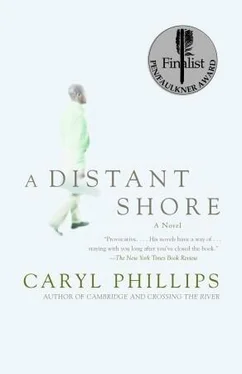“You got a parachute?” She says nothing. “Cos you’re gonna fucking need one if you come round here talking like that.”
“You can keep the money, I just want her things back, that’s all.” He looks her up and down again.
“You know, you’ve got some front, but you can just fuck off. If I ever set eyes on you again you’re gonna get hurt, am I making myself clear?” She stares at him and wonders what possible nobility Sheila sees in such savages. He was making himself perfectly clear, standing there sweating his filth and spewing his words. Two steps removed from the jungle.
A week after Dorothy came back from Pretoria Mansions, Sheila died. The elderly doctor came to the house twice during the final day, but he said very little. What could he say? Sheila had refused the services of a nurse, and had made it clear that she would not be going near a hospital. There was always a candle burning in her room now, day and night. Redcurrant was her favourite scent, and its pungency permeated the whole house. Conscious almost to the last moment, Sheila lay back, her bald head supported by two pillows, and she stared at her sister. Her skeletal body could no longer summon the energy to maintain conversations, but there was nothing more to be said. At one point Derek telephoned. She took the call downstairs, but having listened to him express his regrets and then wonder if it might be all right for him and Maria to visit, she hung up. She went back upstairs, but Sheila did not ask her who had just called. Sheila never asked anything. Sheila trusted her. An hour later her sister died. She sat with her for a few minutes, and then she blew out the candle and left Sheila in the dark. Downstairs she was momentarily startled by a low gurgling sound that came from the fridge, but she soon regained her wits. She thought of her mum, who always told her eldest child not to search for God in a time of distress because that’s when he’s out of sight and busily taking care of you. “Wait till you’ve dried your eyes, love, then go looking for him. He’ll have more time then.” But her eldest child had never looked for God, and now it was too late.
She made a cup of tea and then sat down at the table and settled herself. To go back upstairs was out of the question, and so she had little choice now but to wait patiently in the hope that she might soon be released from the night that lay ahead. If only she had her piano to hand, for the patterns of music that she had been trying to stitch together in her mind for so long, they all made sense now. But not just music, for there was also a choral accompaniment of voices. Sitting at her sister’s table she could feel this powerful surge of music coursing through her body. For a moment she panicked and wondered if she should transcribe the patterns, but she immediately calmed down. She would not forget. The music had been a long time coming, and its disparate pieces were now secured by grief. They would never again become unstitched.
Dorothy sits before Mr. Jowett. During the past month she has suffered the misery of organising her sister’s affairs. Maria and Derek showed up at the brief cremation ceremony, along with others whom she had never met, but who she presumed had some affiliation with the Labour Party. Roger was conspicuous by his absence, but he sent flowers. The day after the cremation she put Sheila’s house on the market, and she found an unwed professional couple who were not in a chain. They didn’t seem to mind that she intended to leave the curtains and the kitchen blinds, but she got a company to clear the rest of the house. It almost broke her heart to see the huge patches that suddenly glared from the walls where furniture had once stood or pictures had been hung. And then Dorothy fled London and returned home, where she discovered that all her utility bills were red, that the streets were claustrophobically small and narrow, and that everything was so much bleaker in the north. She also discovered that she was truly by herself. The terms of her early retirement package had arrived in the mail. She required a signature from Mr. Jowett, and so an appointment was made with Miss Arthurton. And now she sits opposite Mr. Jowett and listens as he idly asks her what her plans might be, given the fact that she has all this time on her hands. As he speaks he hurriedly signs the papers, in triplicate. Might she be travelling abroad? As he asks this question he leans back, and she listens to the sickening creak of his chair. She says nothing and waits for him to hand her the papers. His good humour offends her, but this will be the last time that she will have to see Mr. Jowett, so she steels herself for the rest of the ordeal. It does not last long. He hands back the papers, but he still seems keen for a conversation to develop. She takes the papers and climbs to her feet. He extends a hand, which she shakes without enthusiasm, and then she turns and leaves, without closing the door behind her.
Instead of walking out of the school she strays in the direction of the staffroom. She stands outside the door, but decides against entering. After all, it is mid-period and it is unlikely that there will be anybody in there. So she walks from one classroom to the next, peering in through the windows and then quickly moving on before anybody can see her. And then she comes to his classroom and she sees him standing at the head of the class with his back to the door. Some of the pupils see her staring in at them. Slowly he turns to face her. He manages to maintain his composure. He throws her a little raised eyebrow of acknowledgement, but this is all. She does not move and now all the pupils are looking at her. He is uncomfortable. Has he found somebody else’s shoulder to cry on? Or has his wife left her squash player and decided to come and live in this town too? What, she wonders, has happened to his life? She feels sorry for him. Helpless man. As he finally gives up the dance of concentration and begins to move towards the door, she turns and walks away from his classroom. She hears the door open behind her, but nobody calls her name and she does not hear the sound of feet pounding down the corridor behind her. She walks out of the school in silence, with Geoff Waverley’s eyes on her back.
She sits in her bungalow at the top of the hill in this village that is five miles outside her home town. She counts the weeks. Eight. Two months have passed. It is a new beginning, in a place in which nobody knows her. She saw a drawing of Stoneleigh in the local paper and she bought her bungalow over the phone. Somehow, the phrase “a new development” sounded comforting. Selling her house was surprisingly easy, largely because she was determined to accept the first offer that was made. In the end it was a decent offer and the buyer, a young Asian doctor, was ready to move in immediately. When she eventually took the bus out to Stoneleigh she was not disappointed. The bungalow was neat, with all mod cons, and it was exactly what she had imagined. They have just finished off the houses in the other cul-de-sac, but the area remains something of a muddy field. Still, she is happy. She looks out of her window and sees the man next door who’s washing his car. He keeps it neatly outside his house as though it’s a prized possession. Aside from this man, there is nobody else in sight on this bleak afternoon. Just this lonely man who washes his car with a concentration that suggests that a difficult life is informing the circular motion of his right hand. His every movement would appear to be an attempt to erase a past that he no longer wishes to be reminded of. She looks at him and she understands.
Mr. and Mrs. Anderson stand with me in the rain. The three of us together, and the priest. Sheltering under the trees there are two men who will eventually cover the coffin with dirt. Their two shovels stand straight, exposed to the rain, with their heads buried deep in the soil. I remain brave, and my eyes are dry. This is what my friend would have wished. The priest closes his Bible, and Mum takes a handkerchief from her bag and she blows her nose. A memorable chapter has reached a conclusion. Mr. Anderson hands me the keys to Mike’s car, but he does not say anything. Mum reaches up and touches my face with her fingertips. I was much caressed by this family, and my attachment and gratitude to them are very great. She is a small thin woman, but this gesture feels strong. Mum holds me in her spell. And then she places the palms of her cold hands against my cheeks and pulls my head down towards her. She kisses me at the point where my wet hair meets my wet skin. And then she releases me.
Читать дальше











![Карен Кингсбери - A Distant Shore [calibre]](/books/384306/karen-kingsberi-a-distant-shore-calibre-thumb.webp)
